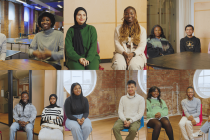What you should know...
The recent amendments to the "Good Character" requirement for asylum seekers and refugees make it significantly harder to gain naturalised status in the UK. Under these changes, from 10 February 2025, applications that involve illegal entry—regardless of when it occurred—will “normally” be refused citizenship. This applies particularly to individuals who have made dangerous journeys, such as crossing by small boat or concealed transport, while those arriving via commercial airlines remain unaffected.
Our response...
At We Belong, we have long advocated for removing barriers that prevent migrants from fully integrating and contributing to British society. The UK’s immigration system should not penalize individuals who arrived as children, as they had no control over their family's decision to seek asylum. Nor should it punish those seeking refuge in the UK in accordance with the Refugee Convention.
Many children and young people already face adversity and gruelling challenges due to navigating the asylum system.
Abdullahi, aged 24, says, "Being an asylum seeker myself, it really upsets me and makes me feel anxious about my sense of belonging. People have different life experiences, so there shouldn’t be only ‘one rule’ that impacts everyone because there’s not a singular reason for people to escape persecution and pursue safety or migrate for better opportunities.
Even though I’ve lived in the UK since a young age, I faced many barriers and navigated the asylum process alone. As a child, even though I excelled in school, I was never able to participate in any school trips or apply for any international opportunities that any of my classmates could access.
To access university, most asylum seekers have to find bursaries or funds, or even do crowdfunding to find a way to access higher education as the universities that offer sanctuary scholarships are very limited. The opportunity for employability for young people in the asylum system is also restricted. As opposed to my coursemates, I couldn't access graduate schemes or graduate jobs. Even when I finished my graduate degree, I applied for a job and passed the application process, but it was withdrawn, not because I didn’t have the skills or wasn’t the right fit but because I didn’t have the right to work.
I feel that even if or when I do eventually become a British Citizen, I will never feel like I belong because my immigration record will always say that I was an Asylum Seeker. Living as a black person in the UK, having a disability, and being a migrant, I always have to be extremely careful of what I do and look over my shoulder to not get into any trouble- even though I’m aspiring to be a lawyer! I feel like it will always make me feel like a second-class citizen. Like I always have to find a way to prove that I belong here. That I deserve to be here."
We strongly urge the government to reconsider these measures and ensure people are granted a fair and unbiased path to citizenship, rather than leaving their futures to uncertainty and stuck in legal limbo.
We call on all to support this cause and stand with us in demanding a just and humane approach to immigration policy.
Kind regards,
We Belong Parliamentary and Policy Working Group
Our Parliamentary and Policy Working Group was created to give young migrants a chance to participate in parliamentary affairs and influence policy. Read more about their work here.

